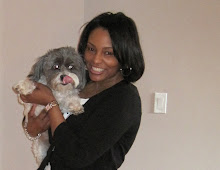
Me Talk Pretty One Day is a book by David Sedaris, one of my favorite authors, that was comprised of short stories about his experiences growing up. One of the stories dealt with his speech impediment and the therapy he received to correct it. I borrowed the title of his book to talk to you about Black Dialect.
Today we interviewed a young Black girl who was well educated and held a BA and a MA in Human Resources. On paper she is a great candidate. She is well qualified and has the right attitude. However, there is one thing standing in the way of her having the job....she talks with such a heavy, Chicago westside, urban accent/dialect. (Yes there is a difference between west side and south side Black dialect).
I have long since had a fascination with Language Arts and Linguistics. In fact, a few years ago I considered going back to school to study linguistics. I always wanted to understand how speech, accents and dialect patterns evolved. Why exactly do people in the South have such a distinct "southern accent?" Why do people in Queens or Brooklyn NY have a very pronounced way of speaking? Why do Midwestern people talk in such a flat tone?
The one thing that has intrigued me the most is the distinct way Black people talk and sound. And even within the Black culture there are geographical differences. A Black person in NY talks very different than one in LA.
I researched why Black people have a tendency to use verbs incorrectly, like "I be" and "you is" and "I was like." I learned in African languages there often is no difference between present, past and future tense or singular and plural. So when early African settlers (aka slaves) tried to learn American English they tried to squeeze it into the format of their own native languages. The same way as all other immigrants try to fit American English into their native tongue. It makes alot of sense.
However, most would argue that Blacks are so far removed from that period of time of slavery and early settlement in the U.S. and so far removed from their original language they ought not still talk and communicate that way. My opinion that it is etched on our DNA like the natural tendency to have rhythm.
I don't necessarily agree that speaking in a Black dialect is the right way to speak in professional settings but I always think about about all the concessions we allow immigrants. Mexicans, Indians, Russians, Germans, French. We think it's cute when a french person speaks American English with a "french accent." Why do we frown upon the Black person who speaks in a Black dialect?
I could go on and on talking about this because I really find it interesting but for the sake of today's conversation I'm going to focus on Black dialect and professionalism in Corporate. So as I said earlier, we interviewed a young, Black girl who is qualified for the HR position but her manner of speaking is going to be the barrier to this job, and quite frankly, alot of professional jobs in a Corporate setting. She currently works in a pseudo-call center environment and that's exactly what she sounds like. Like someone who works in a call center. I touched on this in an earlier post titled, Currency Exchange, that was met with some criticism but I'm often told I say what other people are thinking.
So, getting to my point.....this girl is going to have to "break" the urban manner in which she speaks while at work if she wants to be successful. She is going to have to dial it down a few notches. But how do you tell someone that they sound "too urban?" She probably does not even hear it in herself as most people. I, myself, can turn it up or "slip" unknowingly from time to time.
It's not even that she is speaking incorrect English. She uses verbs correctly and she enunciates well. It's the actual tone and fillers (um, you know, like and the eye rolling)that makes her sound unpolished.
An example that comes to mind is Danielle from America's Next Top Model. Danielle was often criticized by Tyra and the judges for how she spoke. They said it was the southern accent but really they were trying to explain that she spoke with alot of edge. Rough edge. Danielle ended up being chosen as that cycle's winner for Top Model but the young lady I interviewed today is auditioning for a different type of reality show. The White dominated Corporate America Reality Show. And if she does not figure out how to dial her dialect down, she will wonder why she is unable to start actually applying all the education she has obtained.

No comments:
Post a Comment